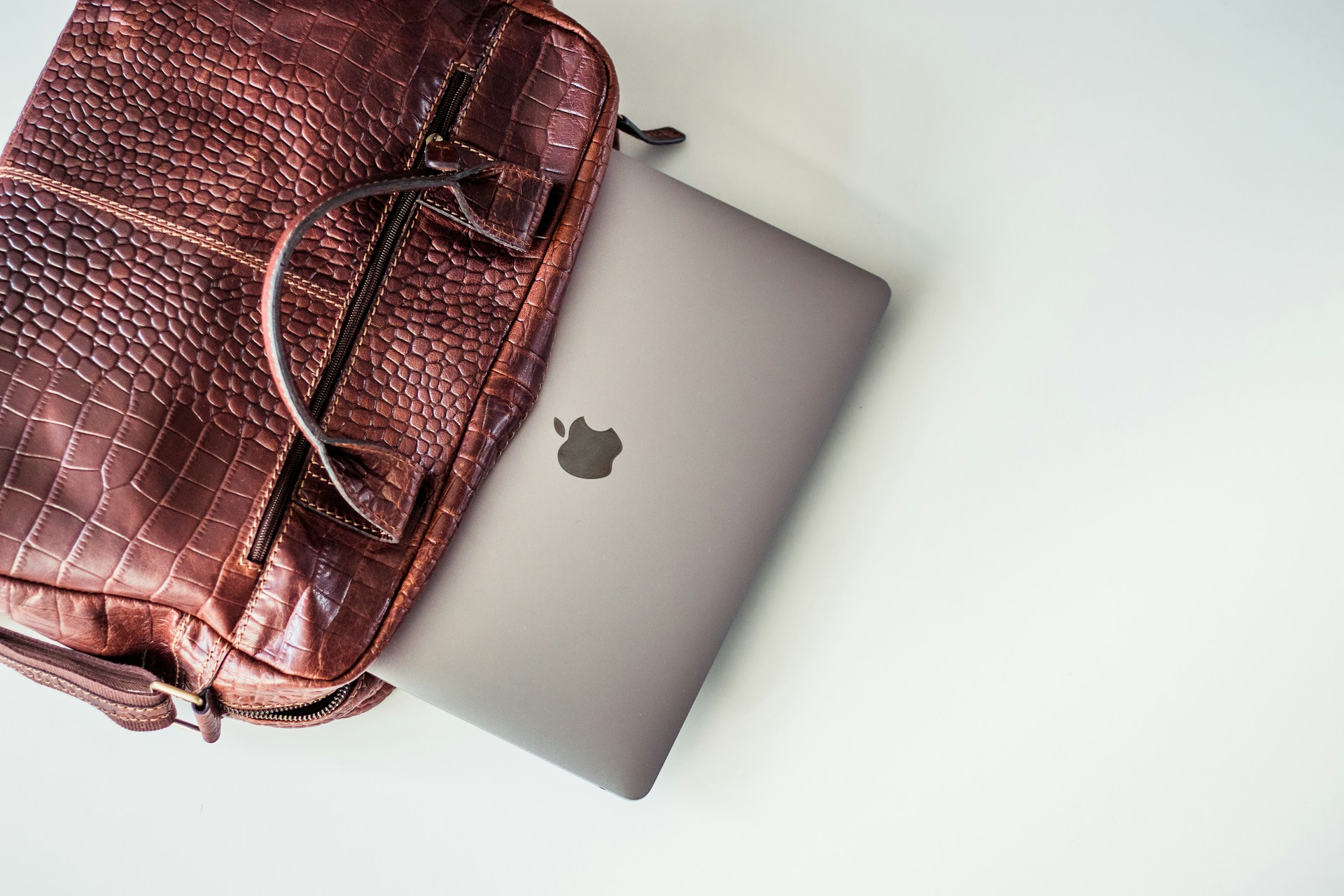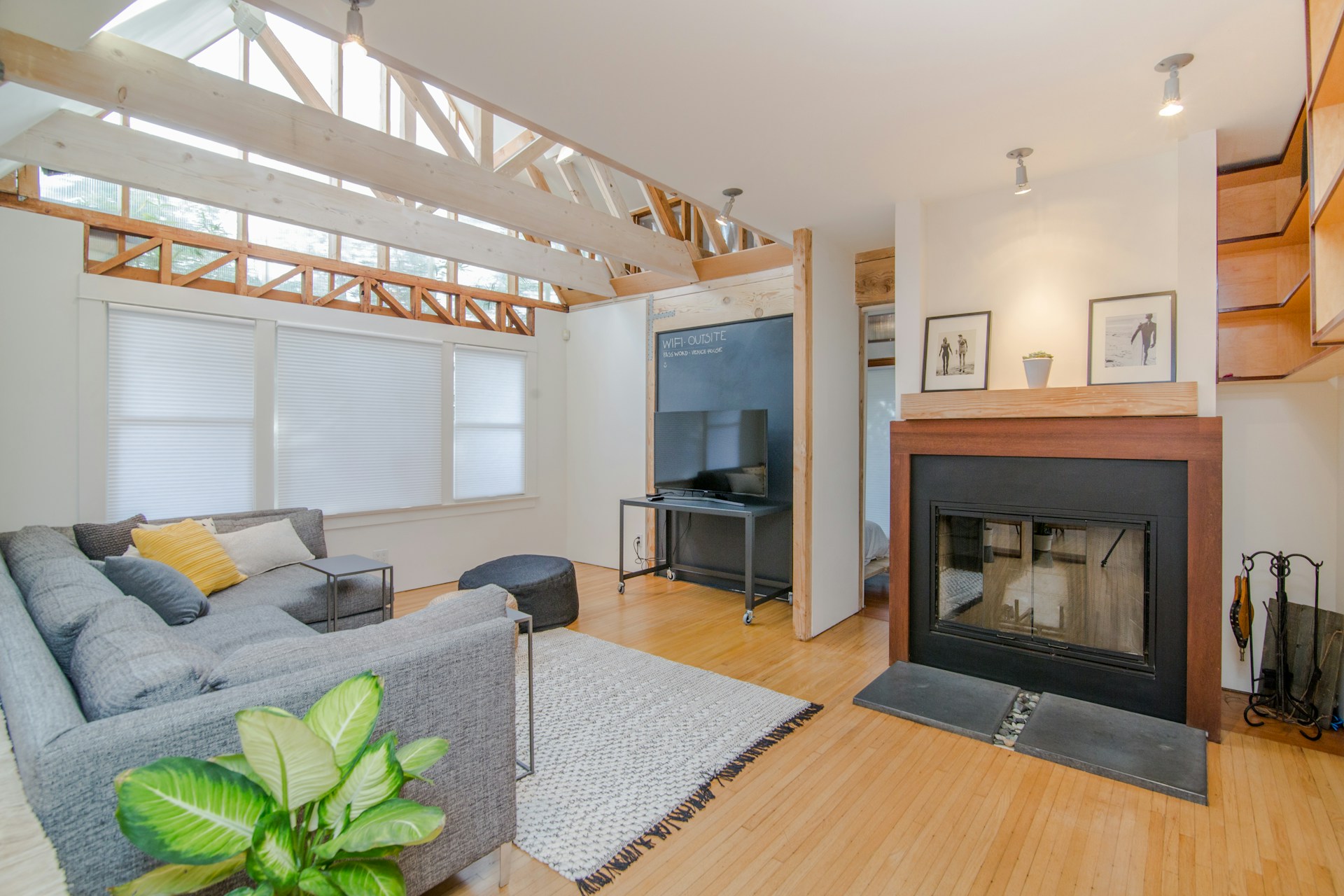Brazil for Digital Nomads: A Guide to Work and Life
Plan your stay as a digital nomad in Brazil: discover costs, accommodations and activities that will enrich your experience in the country.
Being a digital nomad in Brazil is not a crazy idea. This is a diverse destination, with stunning beaches and warm weather for most of the year.
This country is famous for its music and festivals and has become a haven for remote professionals. In 2022, Brazil ranked as the second country in Latin America with the most digital nomads, second only to Mexico.
Stay tuned for relevant facts before you travel to Brazil, from visa options to tips on accommodation and cost of living. Get ready to discover why Brazil could be your next home.
Why choose Brazil as your digital nomad destination?
Diverse culture
Brazilian culture is a mix of indigenous, African and European influences, resulting in a variety that is reflected in music, art and gastronomy.
This multicultural environment enriches the living experience and can inspire digital nomads in their work and creativity. With iconic festivals such as carnival and cultural events throughout the year, there is always something to explore and enjoy.
Affordable cost of living
Compared to many countries in North America and Europe, the cost of living in Brazil is low. For example, renting a one-bedroom apartment in São Paulo can cost around $500, while, in cities like Curitiba or Belo Horizonte, prices can be even lower.
This allows you to enjoy a high quality of life at an affordable cost, making it perfect for those looking to save while working remotely.
Warm climate and breathtaking scenery
Brazil has a warm and sunny climate for most of the year, allowing you to enjoy paradisiacal beaches, lush jungles and breathtaking mountains.
From the iconic beaches of Ipanema to the vast Amazon rainforest, Brazil offers endless opportunities for recreation. Its natural surroundings enhance leisure time, promote well-being, and encourage a more active lifestyle.
Digital nomad communities
Cities such as São Paulo, Rio de Janeiro and Florianópolis are home to active communities of digital nomads.
São Paulo has more than 150 coworking spaces, where professionals can work, collaborate and socialize. These cities offer networking opportunities, as well as events and activities that foster the connection between professionals from different areas.
In addition, many social networking groups organize meetings and activities for integration and exchange of ideas.
Growing technology infrastructure
Brazil has been investing in improving its technology infrastructure, which has led to an increase in internet connectivity.
In major cities, high quality internet speed is readily available, which is critical for digital nomads. According to a report by Statista, more than 80% of the Brazilian population has access to the internet, which enhances the remote work experience.
Visas and requirements for entry as a digital nomad in Brazil
Digital nomads planning to visit Brazil can benefit from the digital nomad visa, in force since 2022, which allows residency in the country for up to two years. This type of visa is designed for those who work remotely, facilitating the stay and legalization of their situation.
Brazil’s digital nomad visa is perfect for those looking to explore the country and enjoy an extended stay without dealing with immigration hassles.
| Features | Details |
| Duration | Up to 2 years, with the possibility of renewal. |
| Work | Permitted, provided it is remote and outside Brazil. |
| Documentation | Proof of remote work, proof of income. |
| Cost | Around $100 (subject to change). |
| Requirements | Medical insurance and criminal record. |
For more details, check out our guide about the visa for digital nomads in Brazil.
Where to live and work as a digital nomad in Brazil?
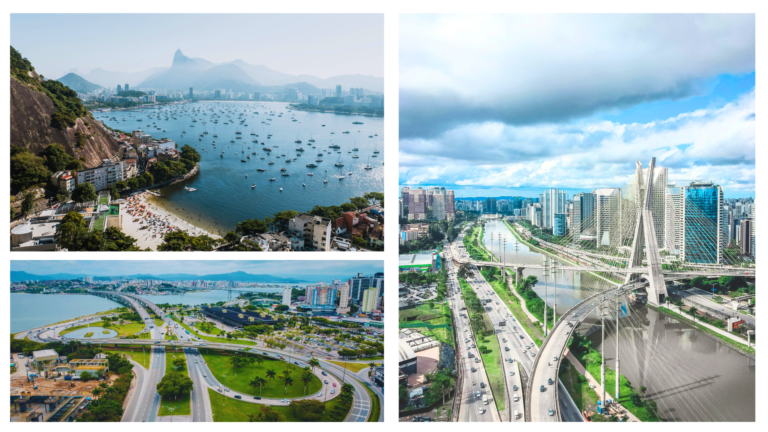
São Paulo
As Brazil’s largest city, São Paulo is a financial and cultural center with a vast array of coworking spaces, restaurants and cultural events.
São Paulo has a dynamic urban life, with museums, theaters and a diverse gastronomic scene. The city has an extensive transportation network and a temperate climate.
Notable coworking spaces include WeWork and Nex Coworking, which offer modern environments and connections with other professionals, from $10 to $20 per day and monthly rates from $100 to $250.
Rio de Janeiro
Known for its stunning beaches such as Copacabana and Ipanema and its famous carnival, Rio is perfect for those looking for a more relaxed atmosphere.
The city combines the natural beauty of mountains and oceans with an active social life. The climate is warm and humid, conducive to enjoying the outdoors.
The digital nomad community in Rio has grown, with coworking spaces such as We Work, Habitat Coworking and Coworking Río popular with remote professionals. Prices can range, in daily access, from $8 to $20, and $150 to $500 per month.
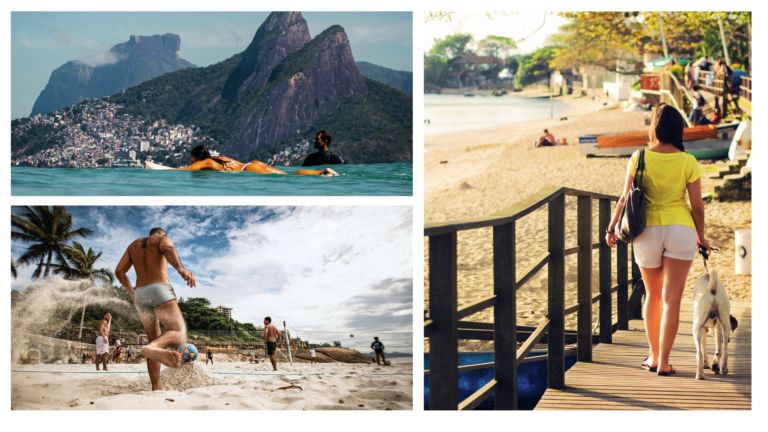
Florianópolis
Known as “the island of magic”, Florianópolis is famous for its paradisiacal beaches and laid-back lifestyle, for digital nomads who value a tranquil environment and outdoor activities such as surfing and hiking. The quality of life here is high, and the community is welcoming to outsiders.
Impact Hub’s shared offices are popular here for their community atmosphere and networking opportunities. Daily rates can range from $8 to $16, and monthly rates from $200 to $500.
Accommodation options
Colivings
Coliving spaces like Selina in São Paulo and Rio de Janeiro offer flexible accommodation and shared work areas. These places are perfect for nomads who want to share with an active community and live conducive to collaboration.
Prices range from $300 to $800 per month, depending on location and room type. Selina, for example, offers both beds in shared rooms and private suites.
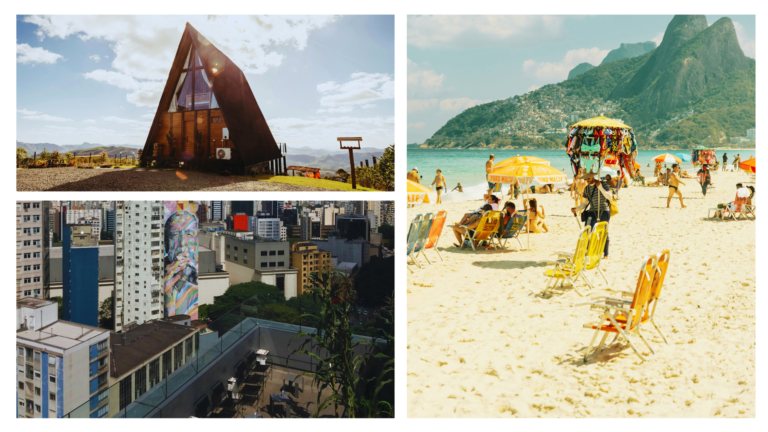
Hotels and apartments
Platforms such as Airbnb and Booking.com offer a wide range of options, from shared rooms to full apartments. Prices can range from $20 to $100 per night, depending on location and amenities.
For example, in Rio de Janeiro, you can find apartments in Ipanema starting at $70 per night. In São Paulo, an apartment in the Vila Madalena neighborhood can cost around $60 per night.
If you are looking for a cheaper option, hostels and hotels are a great alternative. In Florianópolis, The Search House is a highly rated two-star hotel with shared and private rooms, from $15 to $60 per night. It also has a swimming pool, coworking spaces and even sports equipment rental if water sports are your thing.
Internet Connection
Brazil has improved its internet infrastructure in recent years. The average speed ranges between 25 and 55 Mbps, which is adequate for most work activities. In addition, many cafes and public spaces, such as libraries, offer good Wi-Fi connection like the São Paulo Public Library and Café do Mercado, in Rio de Janeiro.
Don’t worry anymore about how you will work during your stay as a digital nomad in Brazil. Purchase Holafly’s eSIM for Brazil with unlimited data and get access to high-speed internet anywhere in the country.
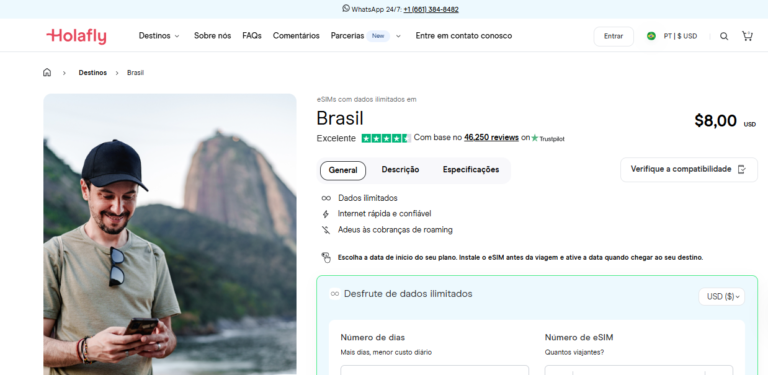
Important: If you are a frequent traveler and want to stay connected without worrying about expensive roaming or looking for a new SIM at every destination, Holafly’s subscription plans are for you. With a single eSIM, enjoy internet in more than 170 countries for a fixed price and no surprises on your bill. travel without limits and connect easily and securely! 🚀🌍
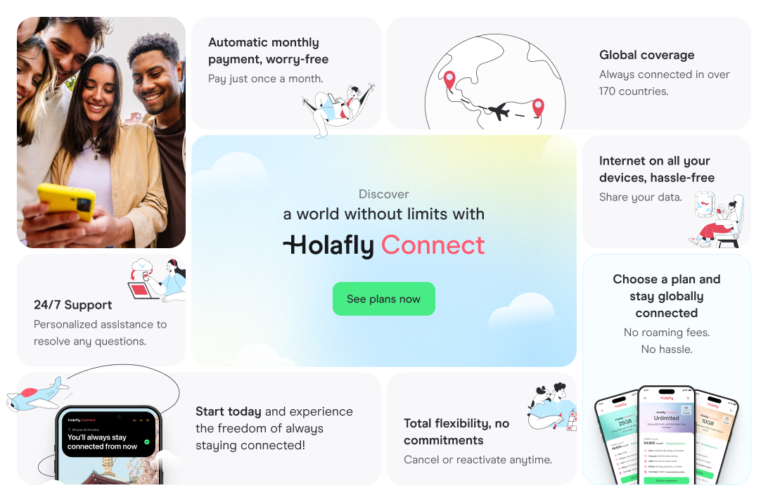
How does a digital nomad pay taxes in Brazil?
| Tax residency | They are considered tax residents if they stay more than 183 days in Brazil within a year, which implies the obligation to declare income and pay taxes in the country. |
| Income tax | Residents must pay Income Tax (IR) on all their global income, whether generated in Brazil or abroad. Rates are progressive, reaching up to 27.5%. |
| Annual tax return | Tax returns are filed annually, and rates vary according to income. |
| Taxes on fixed income | For fixed income investments, taxes are imposed on gains, with rates depending on the length of time the asset is held. |
Double taxation treaties
Brazil has 36 agreements with countries such as the United States, the United Kingdom and Spain to prevent nomads from paying double taxes. These allow:
- Exemptions or reductions in the nomad’s country of residence, if it is proven that he/she has already paid taxes in Brazil.
- Certificates of residence: Can be requested to benefit from these treaties.
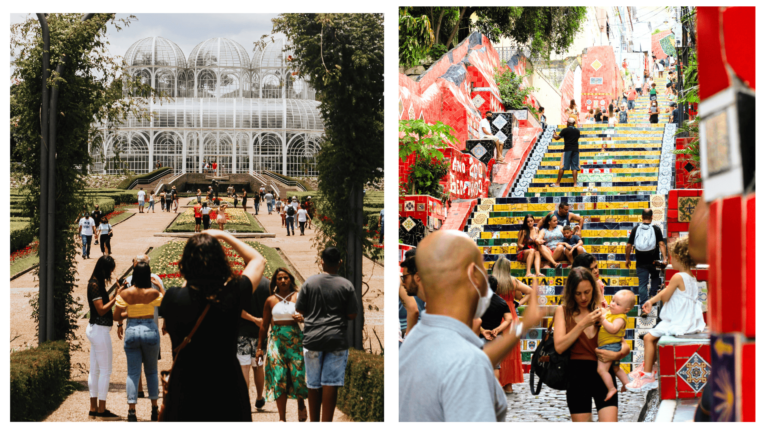
Health insurance and quality of healthcare in Brazil
The health care system in Brazil for foreigners is divided into two components: the public system (SUS) and the private system.
1. Unified Health System (SUS)
| Universal Access | Offers free medical care to residents and citizens, including foreigners, although quality may vary. |
| Basic Care | Access to consultations, emergencies and hospitalization, with the need to present an identification document. |
| Limitations | Waiting times and limited resources may apply. Enrollment is beneficial for extended stays. |
2. Private Health System
| Health Insurance | Many opt for private insurance to obtain faster and better quality care. |
| Medical Care | Private clinics and hospitals tend to have shorter waiting times, but at a higher cost. |
| Direct Payment | Without insurance, consultation and treatment costs can be high. |
Medical insurance recommendations
It is recommended to purchase health insurance before traveling to Brazil to cover any emergencies. Some popular insurances for digital nomads include SafetyWing, World Nomads and Allianz, which offer flexible and affordable coverage.
Basic expenses for the daily life of a digital nomad in Brazil
Transportation and mobility
- Driver’s license: You can use an international driver’s license or an official translation of your local license to drive for up to three months.
- Public transportation: Major cities such as São Paulo, Rio de Janeiro and Curitiba have bus, subway and train systems. Fares are affordable, ranging from one to two dollars per trip.
- Transportation apps: Use apps such as Uber and 99 for more convenient travel.
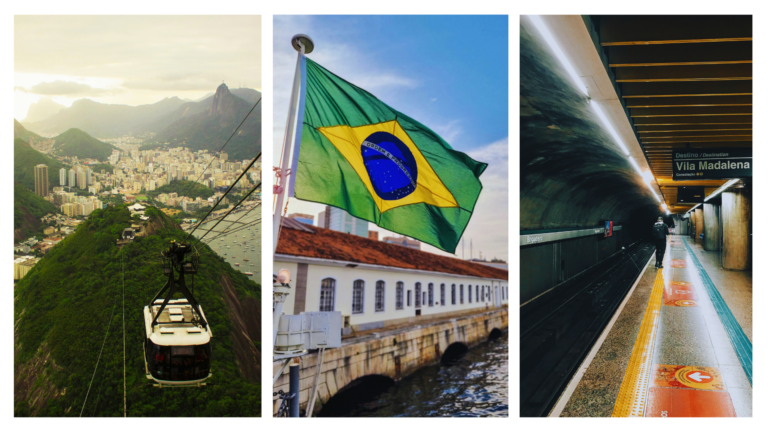
Financial management
- Recommended banks:
- Banco do Brasil: Offers a wide range of services and a good ATM network.
- Nubank: Is a digital bank popular with foreigners, with low fees and an easy-to-use app.
- Cash withdrawals: ATM fees can be as high as five dollars. Withdraw money in large amounts to minimize commissions.
- Currency exchange: You can exchange to local (real) currency at exchange houses, banks or at the airport. Look for the best rates at sites such as Wise or Revolut, which offer more favorable conversions than traditional banks.
Food costs
- Supermarkets: Places like Pão de Açúcar and Carrefour are ideal for shopping. A monthly food budget can range from $200 to $400, depending on your habits.
- Restaurants:
- Lunch at an inexpensive restaurant: $10 to $15.
- Mid-range restaurant: $20 to $40.
- Local markets: Don’t miss the local markets, where you can find delicious and affordable food.
Cultural and outdoor activities in Brazil
Brazil offers a rich cultural offer that you cannot miss. Attending emblematic festivals such as the Carnival in Rio de Janeiro, the Paraty Music Festival or samba events is a unique experience that captures the essence of the country. Tickets for these events usually range from 10 to 50 dollars, making them affordable to enjoy the local culture.
In addition to culture, you can surf at Rio’s famous beaches, hike in the Tijuca National Park or visit the majestic Iguassu Falls.
Many of these activities are free or have a very low cost, allowing you to enjoy nature without compromising your budget.
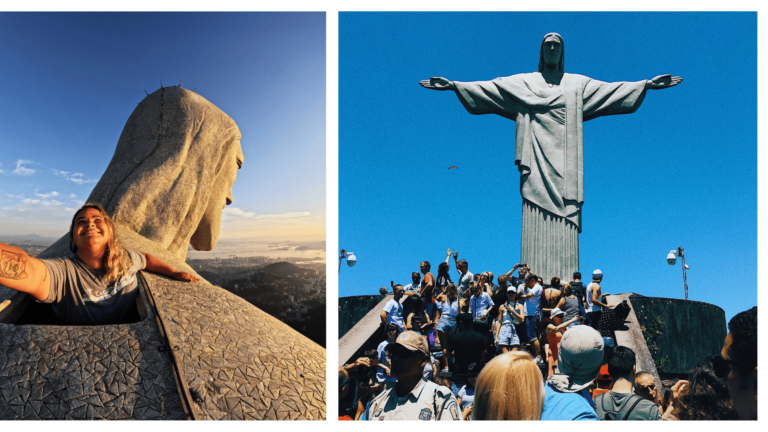
Sightseeing
In Rio de Janeiro, be sure to visit Christ the Redeemer, Sugarloaf Mountain and the iconic Copacabana and Ipanema beaches.
In São Paulo, explore Ibirapuera Park, which offers green spaces and cultural activities, as well as the São Paulo Museum of Art (MASP), known for its impressive art collection.
Don’t forget to walk along Paulista Avenue, an important cultural and financial center of the city.
Finally, Florianópolis is famous for its beautiful beaches and relaxed atmosphere, making it a paradise for nature lovers. Here you can enjoy various outdoor activities and explore its enchanting coastline.
Best seasons to be a digital nomad in Brazil
Weather and season in Brazil
The high season in Brazil runs from December to March, making it the best time to enjoy the country’s beautiful beaches. However, it is important to keep in mind that some areas may experience sudden rains, especially in the north and southeast. We recommend you to be prepared for weather changes.
Recommended clothing
When packing, bring light and comfortable clothing, as well as bathing suits and sunscreen to protect you from the sun.
An umbrella or raincoat is also useful during the rainy season. If you plan to visit cooler areas, such as southern Brazil, don’t forget to include some warm clothes to adapt to temperature variations. With this preparation, you will be able to enjoy your stay in Brazil to the fullest.
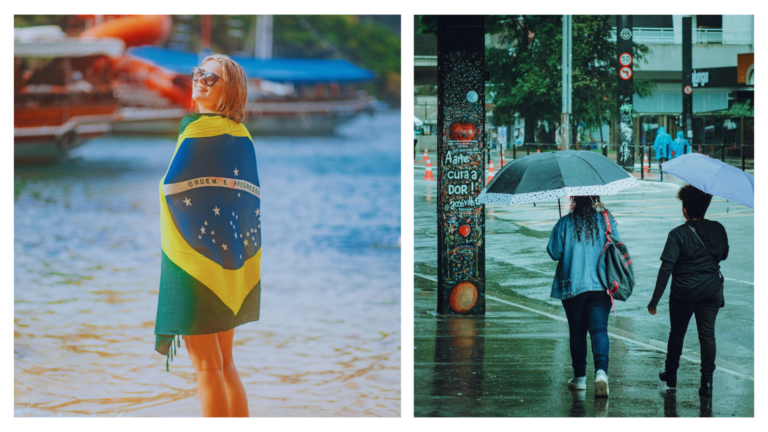
Average cost of living as a digital nomad in Brazil
The average total monthly cost of living as a digital nomad in Brazil ranges from $860 to $2,100. In general, Brazil offers an affordable lifestyle for digital nomads. With good financial planning, you can enjoy all the advantages this country has to offer.
| Category | Average cost in dollars | Details |
| Accommodation | 300 – 800 | Colivings such as Selina and rooms in hostels or apartments. |
| Coworking Spaces | 100 – 500 | WeWork, Nex Coworking, Habitat Coworking. Prices vary according to location and services. |
| Food | 200 – 400 | Meals in supermarkets (Pão de Açúcar, Carrefour) and restaurants. Economy meals: $10-15, mid-range: $20-40. |
| Public Transport | 30 – 60 | Average fare between $1 and $2 per trip. Using apps such as Uber may increase the cost. |
| Entertainment | 50 – 150 | Attending festivals and cultural activities, tickets between $10 and $50. |
| Health Insurance | 50 – 100 | Hiring insurance such as SafetyWing or World Nomads, depending on coverage. |
Frequently asked questions about being a digital nomad in Brazil
Yes, it is recommended to apply for a visa for digital nomads, which allows you to reside in the country for up to two years.
São Paulo, Rio de Janeiro and Florianópolis are popular for their active communities of digital nomads and coworking spaces.
The average monthly cost of living varies between $860 and $2,100, depending on factors such as accommodation and lifestyle.
Yes, there is a wide variety of coworking spaces in the main cities, offering modern environments and networking opportunities.
The average internet speed is 25 to 50 Mbps, adequate for most work activities.
Private health insurance is recommended, as it offers access to quality medical care and shorter waiting times.
The high season is from December to March, ideal for enjoying the beaches, although some areas may experience sudden rains.





 Language
Language 


















 No results found
No results found





